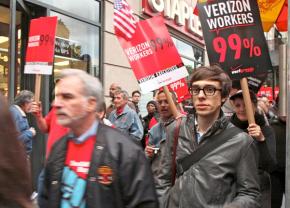Re-energized fight at Verizon
A Verizon worker reports that union members are making common cause with Occupy Wall Street in their struggle against the phone company's demand for concessions.
CARRYING SIGNS declaring "Occupy Wall Street, Occupy Verizon, Occupy Everywhere" and "We are the 99%," more than 1,000 Communications of America (CWA) union members and their supporters rallied and marched in lower Manhattan October 21 to re-energize our contract campaign after negotiations broke down a week earlier.
The CWA joined with Occupy Wall Street activists to point the finger at Verizon for being, as the union said in its call for the march, "the poster child of corporate greed."
That title is accurate for the massive telecommunications outfit. The company is asking for sweeping regressive concessions, yet it made $22.5 billion in profits and paid its top five executives $258 million over the past four years. Even the wire-line sector covered by the union contract--the largely copper infrastructure that provides homes with landlines and DSL service--has been profitable for the last four quarters.
CWA and the International Brotherhood of Electrical Workers, which represents Verizon workers in parts of New England, were forced to strike August 6 when the company refused to budge after two months of negotiations.

The company's offer consisted of more than 100 concessions that would gut the benefits and security for union employees, including leveraging premiums on health care for the first time, freezing pensions and ending job security.
The two-week strike rocked Verizon, especially as the precious reputation of Verizon Wireless got dragged through the mud and business was disrupted by loud, raucous pickets at Verizon Wireless stores.
Although the contract covers workers in East Coast states ranging from Massachusetts to Virginia, stores far beyond that region were the targets of union and community group pickets, much to the company's dismay. That drove Verizon to offer a "fresh start" in negotiations.
Many members thought returning to work without a contract was a mistake, especially given that the agreement ending the strike removed the cap on forced overtime, didn't give amnesty to those charged with discipline for strike-related activity, and banned striking for 30 days and then required a seven-day written notice to stop work.
The company also would have been under stiff pressure to settle when only days after the return to work, Hurricane Irene hit the East Coast, doing considerable damage to local phone networks.
Now, two months later, our fears have been confirmed: Verizon was just trying to get us back with no real commitment to improve their deal. Their last offer before talks broke off still demanded ending all job security, capping pensions, and enormous cost-shifting on health care.
ACCORDING TO someone close to negotiations, the current offer would cost the average family with no catastrophic health conditions upwards of $8,000 a year. While peripheral issues reportedly have been resolved (with no information on who gave in on what), the meat of the contract is far from settled.
During the strike, momentum was growing against the company's obviously opportunistic attack. In the wake of the occupation of Madison's Capitol building in February, more people were siding with the union than in previous contract struggles. That same sentiment is what has been fueling the Occupy Wall Street movement.
When the company again refused to budge on their regressive offer on October 13, the union team proceeded to tell off the company representatives, who then got up and walked away from the table. The unions have since launched a more aggressive campaign against Verizon Wireless, re-initiating leafleting outside stores and calling for the October 21 march with OWS.
These initiatives are an excellent opportunity to connect the outrage that is fueling OWS with a concrete struggle affecting 45,000 members of the 99 percent and their families and communities.
Verizon richly deserves to be the poster child of corporate greed and deeply fears the bad press surrounding the contract struggle. On October 21, in anticipation of hundreds of angry pro-union demonstrators surrounding them, the Verizon Wireless store being targeted closed early to avoid being shut down by the march.
In order for the campaign to win, the union will have to rely on the same forces that gave the strike such vitality: a mobilized membership, solidarity from other unions and support from community groups. The initial efforts have been uneven, with some locals mobilizing heavily for the march and having regular informational picketing, while others have still not had meetings about the breakdown in negotiations.
If the campaign gains momentum, it has the potential to shift negotiations. However, if the union is relying on media coverage to embarrass the company, the lack of coverage of Friday's march doesn't bode well.
Unfortunately, the union isn't talking about striking, even as a tactic to mobilize the members and scare the company. But it is hard to imagine a more favorable climate in which to strike. Occupy Wall Street has exposed how rotten our economy really is for working people despite the happy talk of recovery and the gross inequality within the U.S.
There is no reason for us to be giving concessions. And the membership is well aware that losing pay during a strike--even several weeks' pay--pales in comparison to the scale of the losses in store for us. It will be up to the membership to keep the heat on the company--and, if necessary, move the union to more drastic measures.


